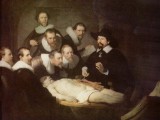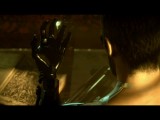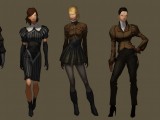Like the original Deus Ex 3 teaser trailer, the latest Deus Ex: Human Revolution teaser chooses to toy with the concepts - humanism, transhumanism, mechanistic anatomy, corporeality - that fascinated the scientists and artists of the Renaissance:
In the new trailer, the subliminal glimpses from before have now been rendered visible and brought to the fore: Not only is the scene of Rembrandt van Rijn’s “Anatomy Lesson of Dr. Nicolaes Tulp” replicated fully in the dream/nightmare sequence, the painting can also be seen hanging on the wall at the very left in the scene afterwards:
Similarly, the flight and fall of Icarus, a story from Greek mythology that has fascinated painters and writers throughout the ages, is now fully incorporated where the original teaser contained a shot of “The Lament for Icarus” by Herbert James Draper:
There are other indiscernible paintings visible in the trailer, too, as well as what appears to be floor plans, designs, scribblings and other notes.
On the one hand, by suddenly visualizing all these images, the production has suddenly moved on from the esoteric to the (naively?) concrete. Vesalius’ “De humani corporis fabrica libri septem” conveniently on the desk… c’mon. Do you have a copy? What about in the year 2027?
On the other hand, all this is rather fitting, as the game is supposed to deal with the raw, tangible origins of augmentation in the Deus Ex universe, only some seventeen years from now. Instead of having elegant augmentation available like in the first and second game, the game presents to us a humanity that is only beginning to grasp the inner workings of the human body well enough to start augmenting it with functional, though crude, mechanical prosthetics.
The underlying thematics, then, point fingers at the potential Icarian qualities of meddling with the human make-up. In this way, my own interest in the game principally lies in the social and the sociological; early concept art illustrated highly well-motivated and -designed clothing and architectural choices that seemed to make perfect sense (see concept art on the right).
The game also promises to discuss the psychological and social effects of augmentation, including discrimination, in the form of augmentism: The earlier trailer contained many hints of this, including banners and signs toting “Augmented people enter from the back” and “We do not welcome augmented people here.”
The official site for the game can be found here.










Share